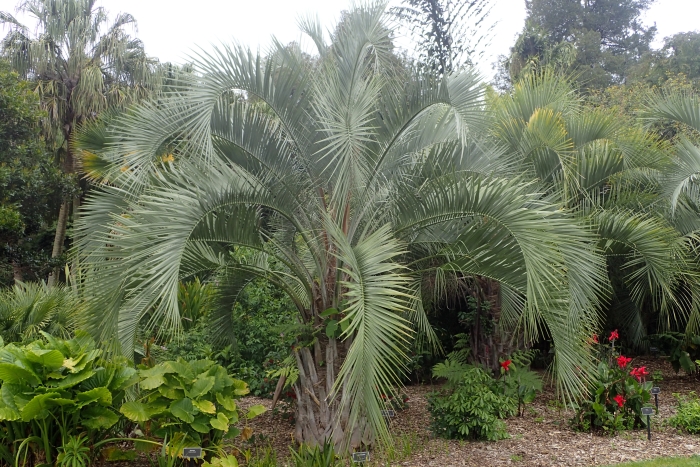Woolly Jelly Palm
(Butia eriospatha)
Woolly Jelly Palm (Butia eriospatha)
/
/

Krzysztof Ziarnek, Kenraiz
CC BY-SA 4.0
Image By:
Krzysztof Ziarnek, Kenraiz
Recorded By:
Copyright:
CC BY-SA 4.0
Copyright Notice:
Photo by: Krzysztof Ziarnek, Kenraiz | License Type: CC BY-SA 4.0 | License URL: https://creativecommons.org/licenses/by-sa/4.0 | Uploader: Kenraiz | Publisher: Wikimedia Commons | Title: Butia_eriospatha_kz3.jpg | Notes: {{Information |Description=Cajanus cajan; a small tree in Tonga |Source= self |Date=16 june 2007 |Author=[[user:Tauʻolunga|Tauʻolunga]] |Permission={{GFDL}}{{cc-by-sa-2.5,2.0,1.0}}}} [[category:Plants of Tonga]] [[Category:Cajanus cajan]] |

























Estimated Native Range
Summary
Butia eriospatha, commonly known as Woolly Jelly Palm, is an evergreen palm native to the grasslands and open woodlands of Southern Brazil. It is characterized by a solitary, often inclined trunk that can be partially subterranean, reaching heights of 10-20 feet (3-6 meters) and a spread of 6-12 feet (1.8-3.6 meters). The palm’s distinguishing feature is its woolly, fiber-covered flower spathe from which it derives its common name. The pinnate leaves are a bluish-green color, creating a striking visual contrast in the landscape. It produces inconspicuous yellow, red, and green flowers in the fall, followed by edible fruits that attract wildlife.
Woolly Jelly Palm is valued for its cold tolerance compared to other palms, making it suitable for cultivation in regions with mild temperate climates. It is often used as a focal point in gardens and landscapes for its unique appearance and texture. This palm prefers full sun to part shade and can tolerate a range of soil types, provided they have good drainage. It is relatively drought-tolerant once established, requiring low to medium amounts of water. While generally disease-resistant, it can be susceptible to lethal yellowing disease in some regions.CC BY-SA 4.0
Woolly Jelly Palm is valued for its cold tolerance compared to other palms, making it suitable for cultivation in regions with mild temperate climates. It is often used as a focal point in gardens and landscapes for its unique appearance and texture. This palm prefers full sun to part shade and can tolerate a range of soil types, provided they have good drainage. It is relatively drought-tolerant once established, requiring low to medium amounts of water. While generally disease-resistant, it can be susceptible to lethal yellowing disease in some regions.CC BY-SA 4.0
Plant Description
- Plant Type: Tree
- Height: 10-20 feet
- Width: 6-12 feet
- Growth Rate: Slow
- Flower Color: Yellow, Red, Green
- Flowering Season: Fall
- Leaf Retention: Evergreen
Growth Requirements
- Sun: Full Sun, Part Shade
- Water: Low, Medium
- Drainage: Medium
Common Uses
Bee Garden, Low Maintenance
Natural Habitat
Grasslands and open woodlands of Southern Brazil
Other Names
Common Names: Wollige Geleepalme, Butiá-Da-Serra
Scientific Names: , Butia eriospatha, Syagrus eriospatha, Cocos eriospatha, Butia punctata, Calappa eriospatha,
GBIF Accepted Name: Butia eriospatha (Mart. ex Drude) Becc.